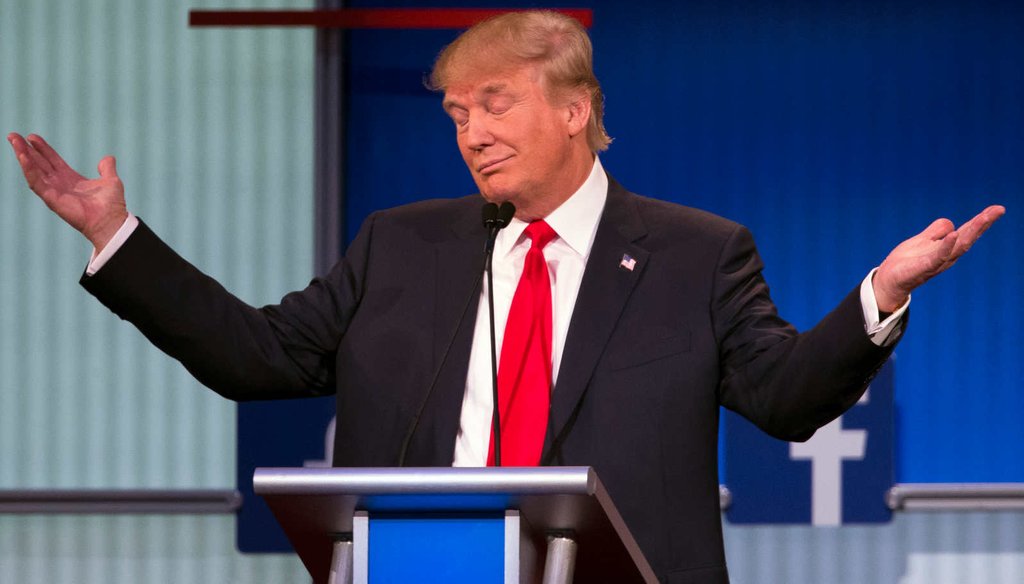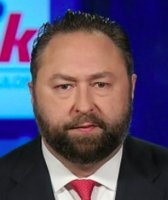Stand up for the facts!
Our only agenda is to publish the truth so you can be an informed participant in democracy.
We need your help.
I would like to contribute

Republican presidential candidate Donald Trump gestures during the first Republican presidential debate in Cleveland, Ohio. (AP)
Seventeen candidates, five moderators, two debates, one Donald Trump. All of it kept the fact-checkers busy Thursday.
Let’s start with Trump.
Early in the debate, Fox News moderator Chris Wallace pressed Trump on some of his past statements about undocumented immigration -- the signature issue of Trump’s campaign.
Wallace asked Trump, "What evidence do you have, specific evidence, that the Mexican government is sending criminals across the border?"
Trump never directly answered the question, though he did cite conversations with "border patrol people" who told him that it was true.
"Our leaders are stupid, our politicians are stupid, and the Mexican government is much smarter, much sharper, much more cunning, and they send the bad ones over because they don't want to pay for them, they don't want to take care of them," Trump said. "Why should they, when the stupid leaders of the United States will do it for them? And that’s what’s happening, whether you like it or not."
The "they send the bad ones over" line rates Pants on Fire.
Trump "does not seem to have gotten the memo, but undocumented migration stopped in 2008 and has been zero or negative since -- not because the economic fundamentals have changed, but because the fertility rate dropped from 6.7 births per woman in 1970 to 2.2 births today, bringing about an aging of the population," said Douglas Massey, a professor of sociology and public policy at Princeton University.
Trump also said illegal immigration "wasn’t a subject that was on anybody’s mind until I brought it up at my announcement."
Certainly he has given the issue some added prominence with his comments. But the issue was very much on plenty of minds before he entered the race for president. We found that claim False.
We looked at media mentions before and after Trump’s June 16th announcement, and found a clear pattern -- illegal immigration was an issue talked about before and after that date.
But Thursday was not all Trump.
The first act
Hours before he took the stage as the frontrunner, an initial group of seven candidates got their turn in a hour-long debate at Quicken Loans Arena in Cleveland.
Former Texas Gov. Rick Perry touted his job-creating credentials, saying something we’ve heard before. Perry said he oversaw the creation of 1.5 million jobs "during the worst economic time this country has had since the Great Depression, while the rest of the country lost 400,000 jobs."
We rated a similar claim from Perry Mostly True.
We found that his numbers were solid, though he cherry-picked a time period arguably giving Texas more of a gloss than if you looked at other periods. More generally, no governor determines job gains or losses in a state; outside factors tend to prevail. In Texas, an oil and gas boom comes to mind. And governors don’t create oil and gas fields.
Less accurate was a claim we heard from Sen. Lindsey Graham, R-S.C., who rehashed a talking point we examined in the 2012 presidential campaign of Jon Huntsman.
Graham said, "I am tired of sending $300 billion overseas to buy oil from people who hate our guts." That statement ignores the fact that a lot of that money actually goes to our friends, such as Canada.
So back in 2011, we rated that claim Half True.
The 9 p.m. debate
At the 9 p.m. debate, and on his home turf, Ohio Gov. John Kasich boasted about his state’s economic successes.
"I took the state of Ohio from an $8 billion hole … to a $2 billion surplus," Kasich said. The Truth-O-Meter rating? Mostly True.
The $8 billion figure is rounded up from a $7.7 billion gap between spending and expected revenues. It was an initial estimate from January 2011, based on the assumption made several months earlier that there would be no new revenue growth. However, revenues did grow as the economy rebounded that year, reducing the gap to between $5.9 billion to $6.1 billion.
Former Arkansas Gov. Mike Huckabee repeated what has been one of the claims PolitiFact has fact-checked the most. The subject: Obamacare.
"If Congress wants to mess with the retirement program, why don't we let them start by changing their retirement program, and not have one, instead of talking about getting rid of Social Security and Medicare that was robbed $700 billion to pay for Obamacare?" Huckabee said.
The notion that $700 billion was robbed from Medicare to pay for Obamacare is Half True.
Obamacare doesn’t literally "rob" Medicare. But the Affordable Care Act does include provisions that reduce future increases in Medicare spending. In other words, the law slows down the rising costs of Medicare.
It’s also important to note that the savings come at the expense of insurers and hospitals, not beneficiaries. (The $700 billion figure is also old by the way, from a 2012 report by the Congressional Budget Office. It’s now updated to about $800 billion.)
Florida Sen. Marco Rubio, meanwhile, was asked by moderators about his lack of executive political experience.
"This election cannot be a resume competition," Rubio said. "It’s important to be qualified, but if this election is going to be a resume competition, then Hillary Clinton's going to be the next president, because she's been in office and in government longer than anybody else running here tonight."
That claim rates Mostly False.
If you only count Clinton’s years as a U.S. senator (2001-08) and and a secretary of state (2009-13), then Clinton has 12 years in office, and that’s easily outpaced by many of the GOP candidates.
Rubio is likely counting her time as first lady of the United States, from 1993 to 2000, when she had a more formal role with her own administrative office and a voice in national policy discussions.
While counting her First Lady years is debatable -- it’s not an elected or appointed office -- counting it would bring her total to about 20 years. If you counted her time as first lady of Arkansas, from 1979-80 and 1983-92, that would bring the total to 31 years.
But Clinton had a private position as a lawyer for the Rose Law Firm during much of this time, so it’s not equivalent to the responsibilities of first lady of the United States.
On the flip side, we counted two GOP candidates with 30 years of government or political experience -- Kasich and Perry.
Rubio was more on the money when he jostled with Trump over some campaign contributions. Trump was asked to explain donations to Democrats, including Hillary Clinton.
"Most of the people on this stage I've given to, just so you understand, a lot of money," Trump said.
Not Rubio, he said. "He supported Charlie Crist," Rubio said, referencing Rubio’s 2010 run for Senate.
During the 2010 Senate race in Florida, Trump gave Crist $4,800. Trump also hosted two fundraisers for Crist that year, and Crist met with Trump to huddle about a prospective campaign as early as 2005. The only caveat, in the context of an exchange about Trump’s imperfect party loyalty, is that Crist was a Republican at the time. So we rated Rubio’s claim Mostly True.
Our Sources
See individual fact-checks.


































